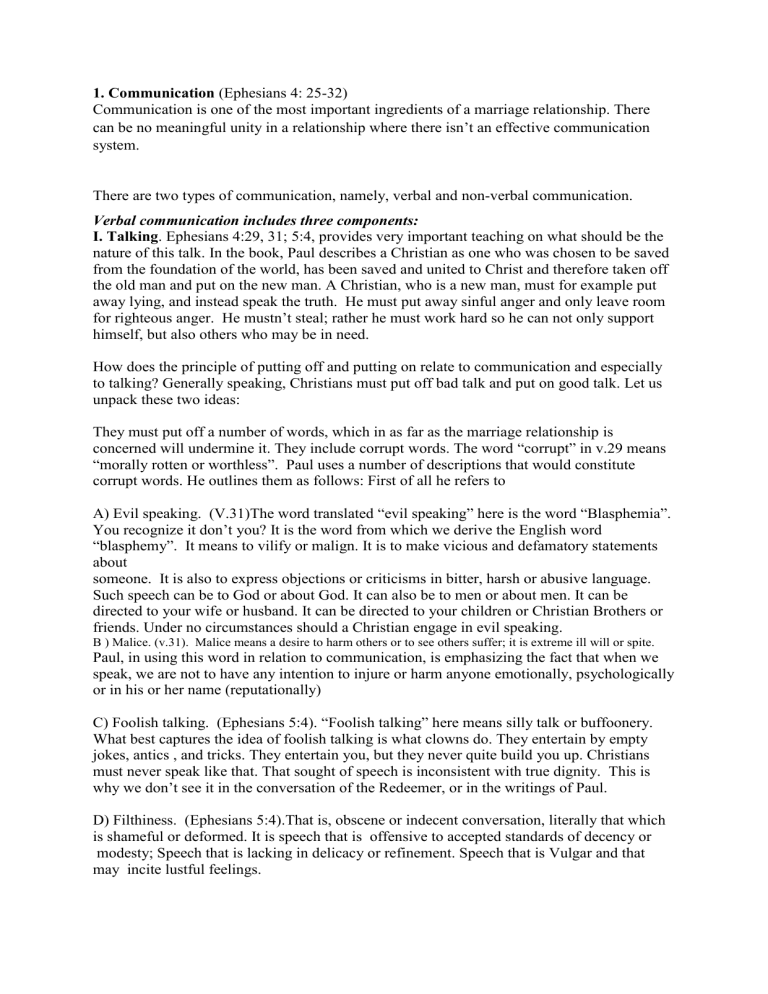
1. Communication (Ephesians 4: 25-32) Communication is one of the most important ingredients of a marriage relationship. There can be no meaningful unity in a relationship where there isn’t an effective communication system. There are two types of communication, namely, verbal and non-verbal communication. Verbal communication includes three components: I. Talking. Ephesians 4:29, 31; 5:4, provides very important teaching on what should be the nature of this talk. In the book, Paul describes a Christian as one who was chosen to be saved from the foundation of the world, has been saved and united to Christ and therefore taken off the old man and put on the new man. A Christian, who is a new man, must for example put away lying, and instead speak the truth. He must put away sinful anger and only leave room for righteous anger. He mustn’t steal; rather he must work hard so he can not only support himself, but also others who may be in need. How does the principle of putting off and putting on relate to communication and especially to talking? Generally speaking, Christians must put off bad talk and put on good talk. Let us unpack these two ideas: They must put off a number of words, which in as far as the marriage relationship is concerned will undermine it. They include corrupt words. The word “corrupt” in v.29 means “morally rotten or worthless”. Paul uses a number of descriptions that would constitute corrupt words. He outlines them as follows: First of all he refers to A) Evil speaking. (V.31)The word translated “evil speaking” here is the word “Blasphemia”. You recognize it don’t you? It is the word from which we derive the English word “blasphemy”. It means to vilify or malign. It is to make vicious and defamatory statements about someone. It is also to express objections or criticisms in bitter, harsh or abusive language. Such speech can be to God or about God. It can also be to men or about men. It can be directed to your wife or husband. It can be directed to your children or Christian Brothers or friends. Under no circumstances should a Christian engage in evil speaking. B ) Malice. (v.31). Malice means a desire to harm others or to see others suffer; it is extreme ill will or spite. Paul, in using this word in relation to communication, is emphasizing the fact that when we speak, we are not to have any intention to injure or harm anyone emotionally, psychologically or in his or her name (reputationally) C) Foolish talking. (Ephesians 5:4). “Foolish talking” here means silly talk or buffoonery. What best captures the idea of foolish talking is what clowns do. They entertain by empty jokes, antics , and tricks. They entertain you, but they never quite build you up. Christians must never speak like that. That sought of speech is inconsistent with true dignity. This is why we don’t see it in the conversation of the Redeemer, or in the writings of Paul. D) Filthiness. (Ephesians 5:4).That is, obscene or indecent conversation, literally that which is shameful or deformed. It is speech that is offensive to accepted standards of decency or modesty; Speech that is lacking in delicacy or refinement. Speech that is Vulgar and that may incite lustful feelings. E) Vain words. (Ephesians 5:6). That is to say, empty words with nothing of value in them. Christians are not to be senseless. More than in anyone else, the Christian must display the image of God in this regard, because he is redeemed. F) Clamor. This is a reference to noisy and uncontrollable words such as men use in a brawl or when they are excited. Christians are to be calm and serious. Harsh contentions and strife, hoarse brawls and tumult are to be unknown among them. They must check what is in their hearts. Our Lord in Matthew 12: 34 asked the question, “How can you who are evil say anything good? And then he drew the conclusion, “for out of the overflow of the heart the mouth speaks”. What men speak is a revelation of what is in their hearts. What is in their hearts therefore is what pre-disposes them to say what they say. And Paul here in Ephesians 4 outlines two factors in the hearts of men that predisposes them to utter evil words etc. The first is: (i) Bitterness (v31). Bitterness is a reference to a sharp and unpleasant experience within the heart. It is to have what it feels to taste something sour and poisonous in the mouth, but this time round it is in the heart. It is acridity. Bitterness is usually due to the harboring of unresolved problems & conflicts in the heart. Grief, anguish or disappointment may be behind it. The problems may be rooted in a poor relationship with God or indeed with our fellow men i.e. spouse/children/brethren In practice, it expresses itself in caustic language or tone, sharpness of words, and resentment or cynicism. Because the heart is bitter, the mouth will be bitter too. Truly “out of the abundance of the heart the mouth speaks”. The other pre-disposing factors are (ii) Wrath & Anger. Although the Greek uses two different words here, they really refer to the same thing. We have already considered the question of anger. But suffice for me to say that the difference between them seems to be one of intensity or degree. Both are a reference to a passion, which is characterized by a feeling of indignation. Wrath (Thumos) may be considered to be the commencement of the passion and anger (Orgee) is the passion carried to its highest pitch accompanied with injurious words and outrageous acts. Christians are to put away all these things. How does the principle of putting on relate to communication and especially to talking? Generally speaking, Christians must put off bad talk and put on good talk. Let us unpack these two ideas: They must put on good words. This begs the question, what is good? What is a good word? The scripture do not leave us in doubt as to what it is: I) They are words seasoned with salt (Col 4:6—10) Let it be such, as has a tendency to oppose and preserve from the corruption of sin. II) They are noble, truthful, righteous words (Proverbs 8:6-8) III) They are courteous or polite words IV) They are soft and gentle words (Proverbs 15:1-2) V) They are words in season (Proverbs 15:23) VI) They are gracious (Proverbs 15:26) VII) They are sweet (Proverbs 16: 21) VIII) They are Judicious (Proverbs 16:23-24) IX) They are restrained (Proverbs 17:27-28 The major reason why we must speak good words is that they may edify or impart grace to the hearer (spouse). II. Listening.. Listening is the ability to accurately and interpret message in the communication process.It is more difficult to listen than to talk. James 1:19 encourages us to be swift to hear and slow to speak. But we must do it bearing in mind the rule of listening. It is ability to receive and actively interpret messages in a communication process. Implies that SPEAKER IS SPEAKING CLEARLY AND AUDIBLY. III. Understanding, relates to appreciating both the verbal and non-verbal messages. An absence of understanding indicates a lack of effective communication. Non verbal communication. This is communication that does not use words. You need to learn to interpret your partners non-verbal communication. It includes: I. Moods II. Facial and hand expressions III. Gestures i.e. when your partner does something special for you or buys you a gift. Each person has a love language and you need to discover each others love language. IV. Silences



